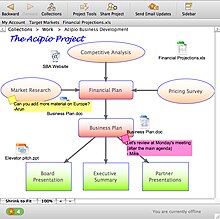Whiteboarding
This article needs additional citations for verification. (January 2021) |

Whiteboarding when used in the context of computing, is the placement of shared files on an on-screen shared notebook or whiteboard. Videoconferencing and data conferencing software often lets documents as on a physical whiteboard.
In hybrid whiteboarding, special handwriting detection software allows for physical whiteboards to be shared with remote and distant users, often allowing for the simultaneous addition of digital content. [1]
Whiteboarding sessions — both in-office and virtual — provide teams with a collaborative, creative environment for brainstorming new ideas and solving problems. Without a defined structure in place, however, these sessions can quickly unravel and get off track.[2]
With this type of software, several people can work on the image at the same time, each seeing changes the others make in near-real time.
Electronic whiteboarding was included at least as early as 1996 in the CoolTalk tool in Netscape Navigator 3.0.
References
[edit]- ^ "Whiteboarding: the definitive guide". ShareTheBoard. Retrieved 2024-04-30.
- ^ "7 Tips for Running Effective Whiteboarding Sessions". Internet Archive. 2020-06-10. Archived from the original on 2023-02-06. Retrieved 2023-07-10.
